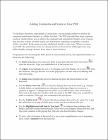| dc.contributor.author | MC CRORY, CATHAL | en |
| dc.contributor.author | KENNY, ROSE | en |
| dc.contributor.author | LAYTE, RICHARD | en |
| dc.date.accessioned | 2014-10-14T10:40:47Z | |
| dc.date.available | 2014-10-14T10:40:47Z | |
| dc.date.issued | 2015 | en |
| dc.date.submitted | 2015 | en |
| dc.identifier.citation | McCrory, C. Dooley, C., Layte, R., & Kenny RA, The Lasting Legacy of Childhood Adversity for Disease Risk In Later Life, Health Psychology, 34, 7, 2015, 687-696 | en |
| dc.identifier.other | Y | en |
| dc.identifier.uri | http://hdl.handle.net/2262/71501 | |
| dc.description | PUBLISHED | en |
| dc.description.abstract | Objective: There has been an increased interest in the role of the childhood social environment in the etiology of adult diseases in recent years. The present study examines whether the experience of adversity during childhood increases risk for disease in later life independent of later life socioeconomic, behavioral, and psychosocial factors. Method: The study involved a nationally representative sample of 6,912 persons aged 50 years and older who were participating in the first wave of the Irish Longitudinal Study on Ageing. Childhood adversity was indexed using a 4-item measure that captured challenging and potentially noxious childhood environmental exposures including, socioeconomic disadvantage, substance abuse among parents, physical abuse, and sexual abuse. A doctor diagnosis of disease across 9 chronic disease types represented the primary outcome variables. Results: The experience of adversity during childhood was associated with increased risk of disease in midlife and older ages across a large number of chronic disease types including cardiovascular disease, lung disease, and emotional, nervous, or psychiatric disorders. Analysis of the dose-response pattern revealed positively graded associations between the number of adverse events experienced during childhood and the occurrence of chronic disease in later life. Cox proportional hazard models revealed that the experience of adversity during childhood was associated with earlier age of onset for any physical disease type or emotional, nervous, or psychiatric disorders. Conclusions: These findings indicate that childhood may represent a sensitive or critical period in the development of disease and reinforces the necessity of adopting a life-course approach to the study of chronic diseases. | en |
| dc.format.extent | 687-696 | en |
| dc.language.iso | en | en |
| dc.relation.ispartofseries | Health Psychology | en |
| dc.relation.ispartofseries | 34 | en |
| dc.relation.ispartofseries | 7 | en |
| dc.rights | Y | en |
| dc.subject | Irish Longitudinal Study on Ageing | en |
| dc.title | The Lasting Legacy of Childhood Adversity for Disease Risk In Later Life | en |
| dc.type | Journal Article | en |
| dc.type.supercollection | scholarly_publications | en |
| dc.type.supercollection | refereed_publications | en |
| dc.identifier.peoplefinderurl | http://people.tcd.ie/mccrorc | en |
| dc.identifier.peoplefinderurl | http://people.tcd.ie/layter | en |
| dc.identifier.peoplefinderurl | http://people.tcd.ie/rkenny | en |
| dc.identifier.rssinternalid | 96574 | en |
| dc.rights.ecaccessrights | openAccess | |
| dc.relation.source | TILDA | en |
| dc.subject.TCDTheme | Ageing | en |
| dc.subject.TCDTag | Adversity | en |
| dc.subject.TCDTag | Age related diseases | en |
| dc.subject.TCDTag | Epidemiology | en |
| dc.subject.TCDTag | Public health | en |
| dc.subject.TCDTag | Social Inequalities | en |
| dc.identifier.rssuri | http://psycnet.apa.org/index.cfm?fa=buy.optionToBuy&id=2014-35070-001 | en |
| dc.relation.sourceuri | http://tilda.tcd.ie/ | en |
| dc.contributor.sponsor | Health Research Board (HRB) | en |
| dc.contributor.sponsorGrantNumber | (ICE/2011/7) | en |




